Toyota Corolla Cross vs VW T-Roc - Differences and prices compared
Compare performance (180 HP vs 150 HP), boot space and price (31700 £ vs 26400 £ ) at a glance. Find out which car is the better choice for you – Toyota Corolla Cross or VW T-Roc?
Costs and Efficiency:
Price and efficiency are key factors when choosing a car – and this is often where the real differences emerge.
VW T-Roc has a to a small extent advantage in terms of price – it starts at 26400 £ , while the Toyota Corolla Cross costs 31700 £ . That’s a price difference of around 5267 £.
Fuel consumption also shows a difference: Toyota Corolla Cross manages with 4.90 L and is therefore somewhat more efficient than the VW T-Roc with 5.50 L. The difference is about 0.60 L per 100 km.
Engine and Performance:
Power, torque and acceleration are the classic benchmarks for car enthusiasts – and here, some clear differences start to show.
When it comes to engine power, the Toyota Corolla Cross has a somewhat edge – offering 180 HP compared to 150 HP. That’s roughly 30 HP more horsepower.
In acceleration from 0 to 100 km/h, the Toyota Corolla Cross is somewhat quicker – completing the sprint in 7.60 s, while the VW T-Roc takes 8.90 s. That’s about 1.30 s faster.
In terms of top speed, the VW T-Roc performs a bit better – reaching 212 km/h, while the Toyota Corolla Cross tops out at 180 km/h. The difference is around 32 km/h.
Space and Everyday Use:
Beyond pure performance, interior space and usability matter most in daily life. This is where you see which car is more practical and versatile.
Both vehicles offer seating for 5 people.
In curb weight, Toyota Corolla Cross is minimal lighter – 1380 kg compared to 1465 kg. The difference is around 85 kg.
In terms of boot space, the VW T-Roc offers somewhat more room – 475 L compared to 425 L. That’s a difference of about 50 L.
In maximum load capacity, the VW T-Roc performs hardly perceptible better – up to 1350 L, which is about 13 L more than the Toyota Corolla Cross.
When it comes to payload, Toyota Corolla Cross minimal takes the win – 560 kg compared to 515 kg. That’s a difference of about 45 kg.
Who wins the race in the data check?
The Toyota Corolla Cross stands out in the key areas in the objective data comparison.
This result only shows which model scores more points on paper – not which of the two cars feels right for you.
Costs and Consumption
View detailed analysis
Engine and Performance
View detailed analysis
Dimensions and Body
View detailed analysis

Toyota Corolla Cross
Toyota Corolla Cross
The Toyota Corolla Cross takes the familiar Corolla recipe, lifts it up and dresses it in SUV clothes — sensible, comfortable and blessedly unflashy. It won’t thrill the enthusiast, but its easy manners, clever packaging and dependable feel make it an ideal everyday car for shoppers who prefer sense over sass.
details
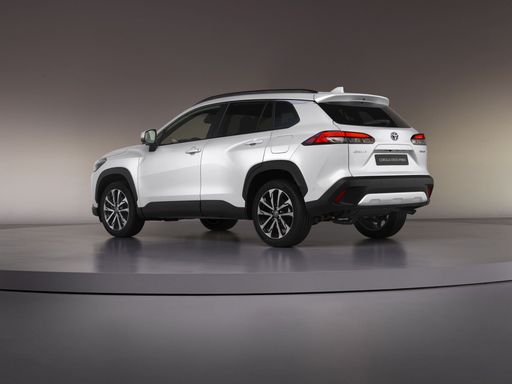
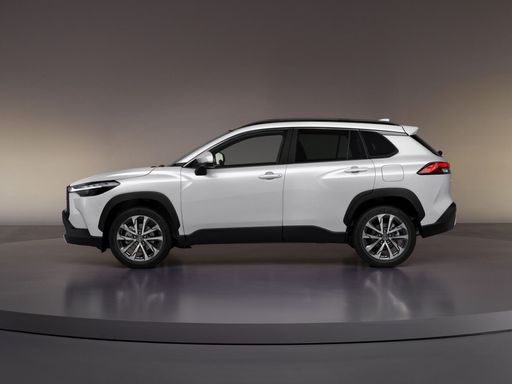

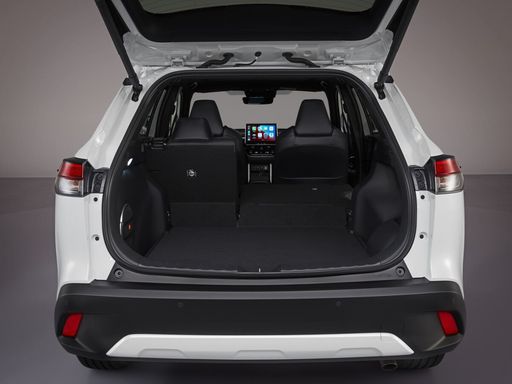
VW T-Roc
The VW T-Roc mixes cheeky, coupe-like styling with the everyday sense and space of an SUV, so it looks fun without sacrificing family sense. It’s a likeable all-rounder with tidy road manners and plenty of personality, ideal if you want a car that’s practical enough for chores but entertaining enough to enjoy.
details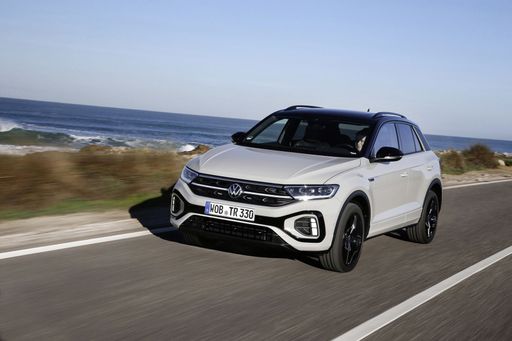
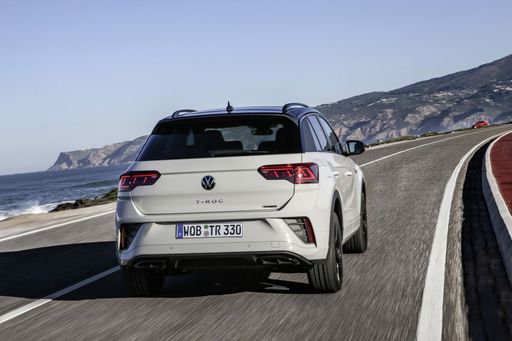
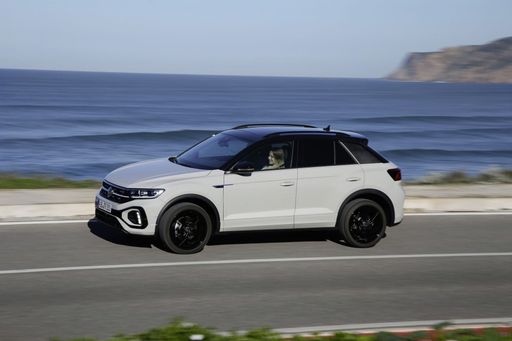
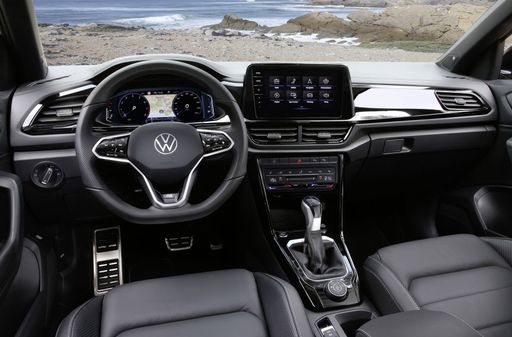
Costs and Consumption |
|
|---|---|
|
Price
31700 - 41900 £
|
Price
26400 - 38600 £
|
|
Consumption L/100km
4.9 - 5.3 L
|
Consumption L/100km
5.5 - 6.3 L
|
|
Consumption kWh/100km
-
|
Consumption kWh/100km
-
|
|
Electric Range
-
|
Electric Range
-
|
|
Battery Capacity
-
|
Battery Capacity
-
|
|
co2
112 - 120 g/km
|
co2
126 - 143 g/km
|
|
Fuel tank capacity
36 - 43 L
|
Fuel tank capacity
50 L
|
Dimensions and Body |
|
|---|---|
|
Body Type
SUV
|
Body Type
SUV
|
|
Seats
5
|
Seats
4 - 5
|
|
Doors
5
|
Doors
5
|
|
Curb weight
1380 - 1500 kg
|
Curb weight
1465 - 1539 kg
|
|
Trunk capacity
414 - 425 L
|
Trunk capacity
284 - 475 L
|
|
Length
4460 mm
|
Length
4373 mm
|
|
Width
1825 mm
|
Width
1811 - 1828 mm
|
|
Height
1620 mm
|
Height
1573 mm
|
|
Max trunk capacity
1333 - 1337 L
|
Max trunk capacity
1350 L
|
|
Payload
515 - 560 kg
|
Payload
368 - 515 kg
|
Engine and Performance |
|
|---|---|
|
Engine Type
Full Hybrid
|
Engine Type
Petrol, Petrol MHEV
|
|
Transmission
Automatic
|
Transmission
Manuel, Automatic
|
|
Transmission Detail
CVT
|
Transmission Detail
Manual Gearbox, Dual-Clutch Automatic
|
|
Drive Type
Front-Wheel Drive, All-Wheel Drive
|
Drive Type
Front-Wheel Drive
|
|
Power HP
140 - 180 HP
|
Power HP
115 - 150 HP
|
|
Acceleration 0-100km/h
7.6 - 10 s
|
Acceleration 0-100km/h
8.9 - 12.3 s
|
|
Max Speed
170 - 180 km/h
|
Max Speed
196 - 212 km/h
|
|
Torque
-
|
Torque
200 - 250 Nm
|
|
Number of Cylinders
4
|
Number of Cylinders
3 - 4
|
|
Power kW
103 - 132 kW
|
Power kW
85 - 110 kW
|
|
Engine capacity
1798 - 1987 cm3
|
Engine capacity
999 - 1498 cm3
|
General |
|
|---|---|
|
Model Year
2025
|
Model Year
2024 - 2025
|
|
CO2 Efficiency Class
C, D
|
CO2 Efficiency Class
E, D
|
|
Brand
Toyota
|
Brand
VW
|
Is the Toyota Corolla Cross offered with different drivetrains?
Available configurations include Front-Wheel Drive or All-Wheel Drive.




